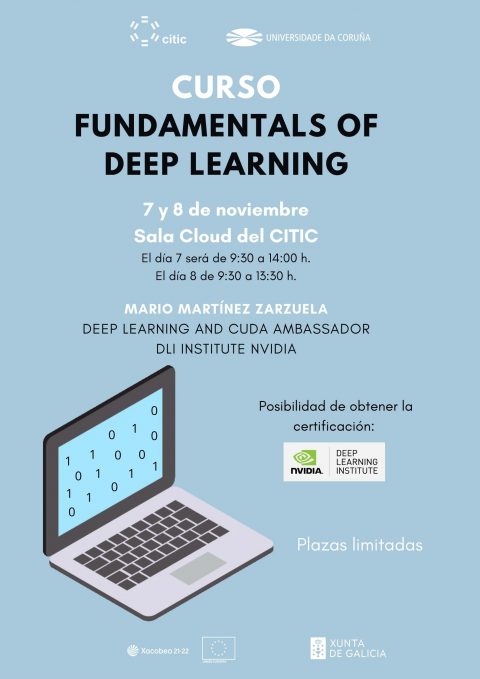SCIENTIFIC AND TECHNOLOGICAL SKILLS
USE OF THE SLURM QUEUING SYSTEM
- Date: December 2, 10-14 and 16-18h
- Modality: Online
- Speakers: Do IT Now
- Program: Morning session: 10-14h
- Solution presentation to users.
- Compute nodes.
- Available storage solutions.
- Rocky Linux distribution.
- Tools for the technical and scientific software environment (EasyBuild).
- Module environment: Lmod.
- Queue manager: Slurm.
- Hands-on.
Afternoon session: 16-18h
- Q&A
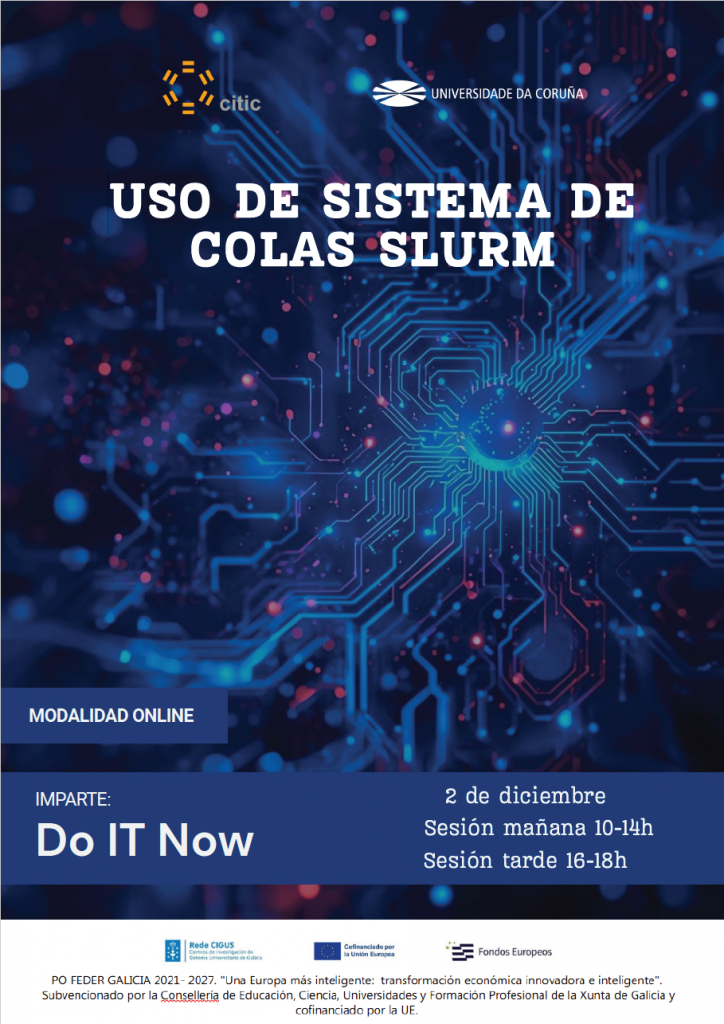
FUNDAMENTALS OF ACCELERATED DATA SCIENCE
- Date: October 22, from 4:00 p.m. to 8:00 p.m. and October 23 from 9:00 a.m. to 1:00 p.m.
- Location: CITIC Network Room
- Speaker: Miguel Ángel Martínez del Amor
- Program: Gain the ability to master big data analytics and GPU-accelerated machine learning with tools such as cuDF, XGBoost, and cuGraph, learning how to deploy models on Triton to solve use cases.
- Block 1: Introduction
- Block 2: GPU-accelerated data manipulation
- Block 3: GPU-accelerated machine learning
- Block 4: Graph AnalysisFinal Project: Data Analysis (Simulation)
- Conclusión
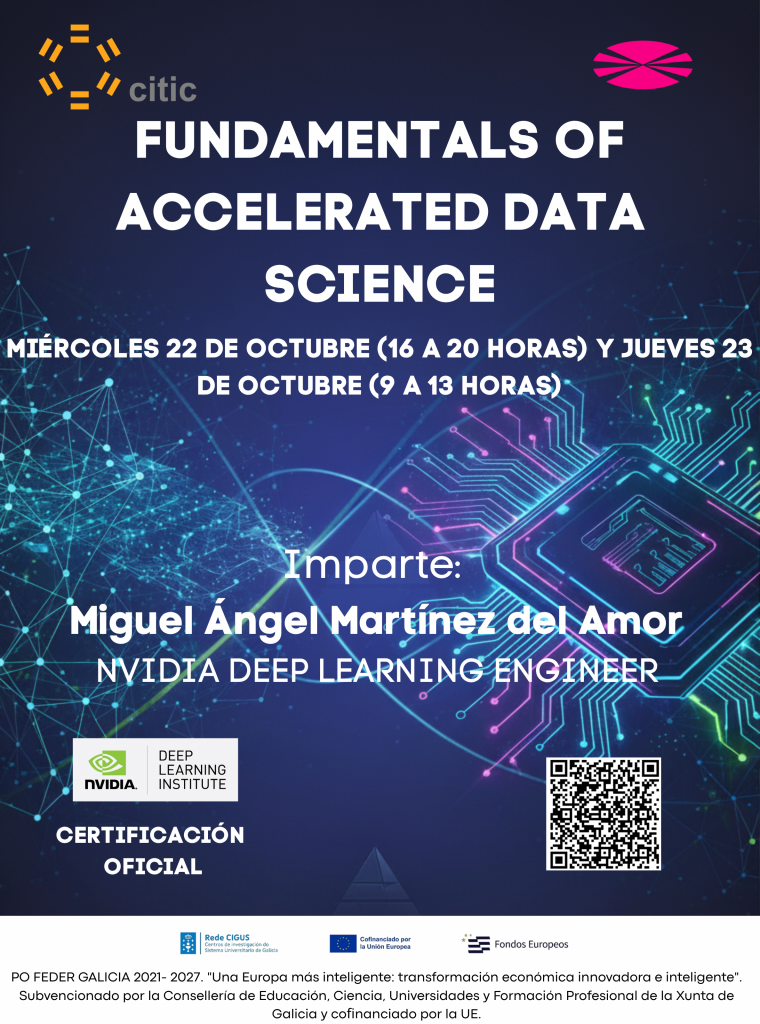
FUNDAMENTALS OF DEEP LEARNING
- Date: October 21, from 4:00 p.m. to 8:00 p.m. and October 22 from 9:00 a.m. to 1:00 p.m.
- Location: CITIC Network Room
- Speaker: Mario Martínez Zarzuela
- Program: Acquire the practical skills in training, architecture, data augmentation and transfer learning necessary to develop your own deep learning projects.
- Block 1: Introduction
- Block 2: The mechanics of deep learning
- Block 3: Pre-trained models and recurring networks
- Final Project: Object Classification
- Conclusion
- Registration form (registrations before October 16)
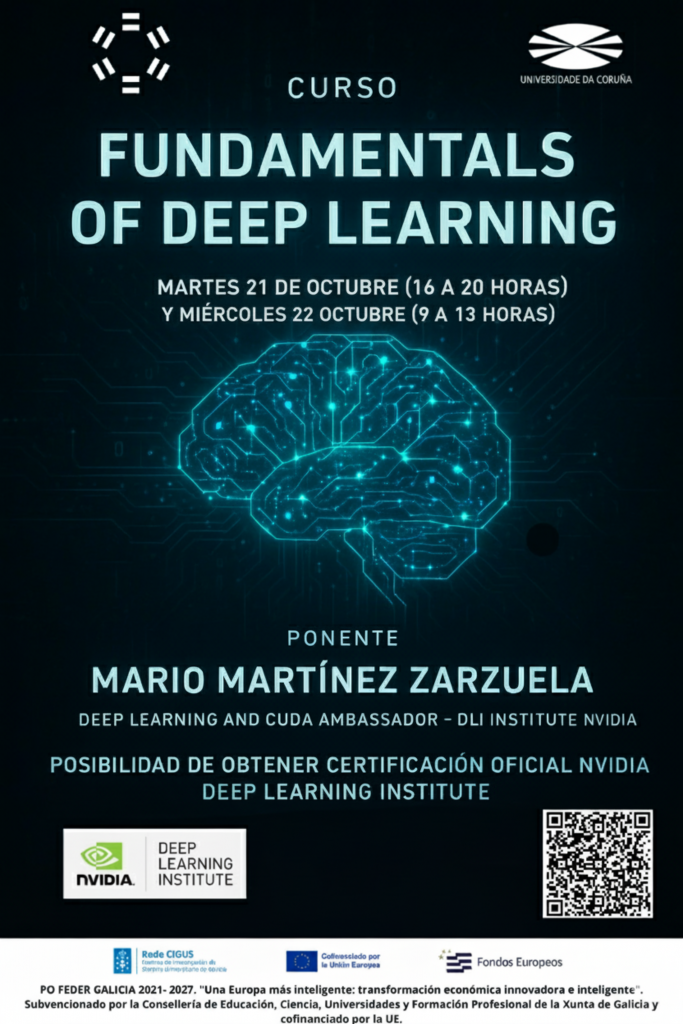
ADVANCED GIT COURSE
- Dates: September 24, 27, 28, 29 and 30, 2025, 4:00 p.m. – 8:00 p.m.
- Location: CITIC Network Room
- Rapporteur:
- Arturo Silvelo – Software development, cybersecurity and marketing specialist. TNR Company.
- Programm: 20 hours
Day 1: Collaborative workflows and advanced branches
- GitHub workflows: GitHub Flow, Pull Requests, revisions, and merges
- Branch Protection Strategies and Mandatory Reviews
- Advanced branch management commands: Rebase (normal and interactive)
- Squash
- Cherry-pick
- Revert
Day 2: Project Management and Advanced Debugging
- Organization and tracking with GitHub Projects (dashboards, automations)
- Issues and milestones: planning and linking with PRs
- Advanced debugging and history analysis commands: Bisect (error localization)
- Blame (line authors)
- Advanced logging
- Reflog (change recovery)
Day 3: Automation, Code Quality, and Hooks
- Automate flows with GitHub Actions (CI/CD)
- Commit and code linting:
- Conventional Commits
- Commitlint
- Husky
- Hooks de GIT :
- Pre-commit
- Pre-push
- Integration with linters and automatic tests
Day 4: Quality and Safety Analysis
- SonarQube integration for code quality analysis
- Using Snyk for vulnerability and dependency analysis
- Semantic versioning strategies (SemVer)
- Generating and signing tags/releases on GitHub
Day 5: Advanced Repository Management
- Submodules and subtrees: differences, advantages and disadvantages
- Strategies for monorepos and work in large teams
- Migration, cleanup, and optimization of repositories
Registration form (registrations until October 30)
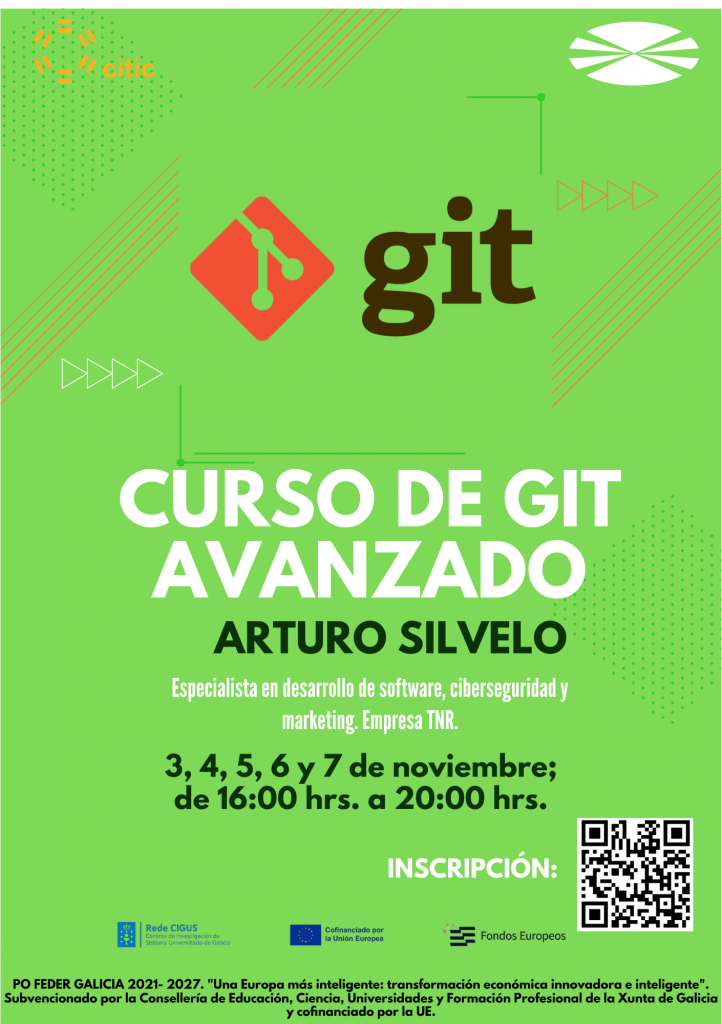
ADVANCED DOCKER COURSE
- Dates: September 24, 27, 28, 29 and 30, 2025, 4:00 p.m. – 8:00 p.m.
- Location: CITIC Network Room
- Rapporteur:
- Arturo Silvelo – Software development, cybersecurity and marketing specialist. TNR Company.
- Programm: 20 hours
- Module 1. Advanced Dockerfile and Image Optimization
- Multi-stage builds: Create lightweight images with separate stages.
- Layer optimization: Minimize layers and leverage cache.
- ARG and ENV: Use of variables for configuration.
- Secrets management: Avoid exposing sensitive data.
- Module 2. Advanced Docker Compose
2.1 Anchors and extends: Reuse common YAML configurations.
2.2 Healthcheck: Service Checking and Dependencies.
2.3 Environments: Managing environment variables and configurations for multiple environments.
- Module 3. Volumes and Advanced Persistence
3.1 Backup with containers**: Create and restore backups with tar.
3.2 Consistent backups**: Strategies for databases.
- Module 4. Private Docker Registry
4.1 Deploy private registry: Basic assembly and configuration.
4.2 Manage images: Upload, delete and maintain the registry.
- Module 5. Orchestration with Docker Swarm
5.1 Local Cluster: Create Test Environment.
5.2 Deployment: Manage stacks and rollback.
5.3 Scaling: Adjusting replicas.
5.4 Network overlay: Communication between nodes.
5.5 Secrets: Manage sensitive data.
- Module 6. Monitoring and debugging
6.1Drivers logging: Centralize logs with different drivers. 6.2Monitoring tools: Use of ‘docker stats’, Prometheus.
6.3 Container Debugging: Techniques for real-time analysis.
- Registration form (registrations before October 20).
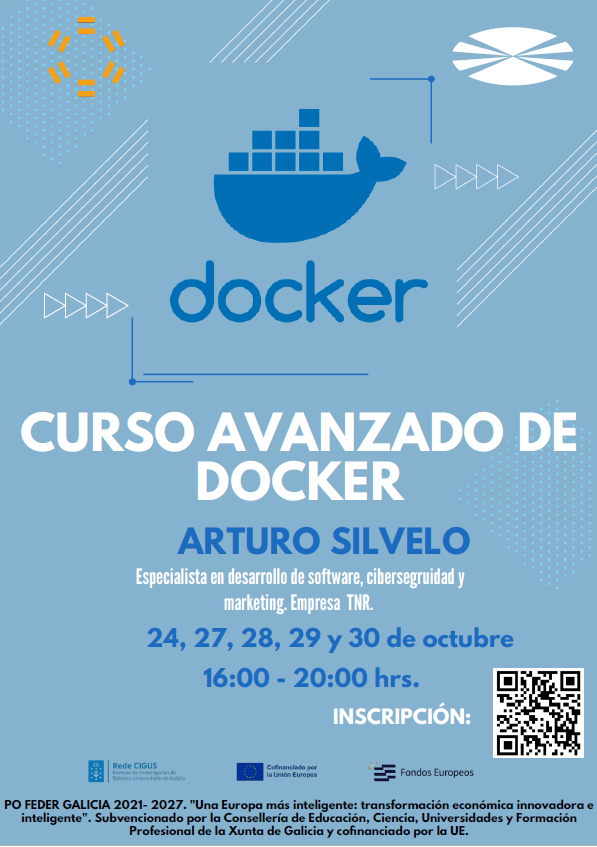
GIT INITIATION COURSE
- Dates: September 22, 23, 24 and 25, 2025, 4:00 p.m. – 8:00 p.m.
- Location: CITIC Network Room
- Rapporteur:
- Arturo Silvelo – Software development, cybersecurity and marketing specialist. TNR Company.
- Registration form (registrations until September 17).

DOCKER INITIATION COURSE
- Date: September 16, 17, 18 and 19, 2025, 16:00 – 20:00 hrs.
- Location: CITIC Network Room
- Rapporteur:
- Arturo Silvelo – Software development, cybersecurity and marketing specialist. TNR Company.
- Registration form (registrations until September 14).
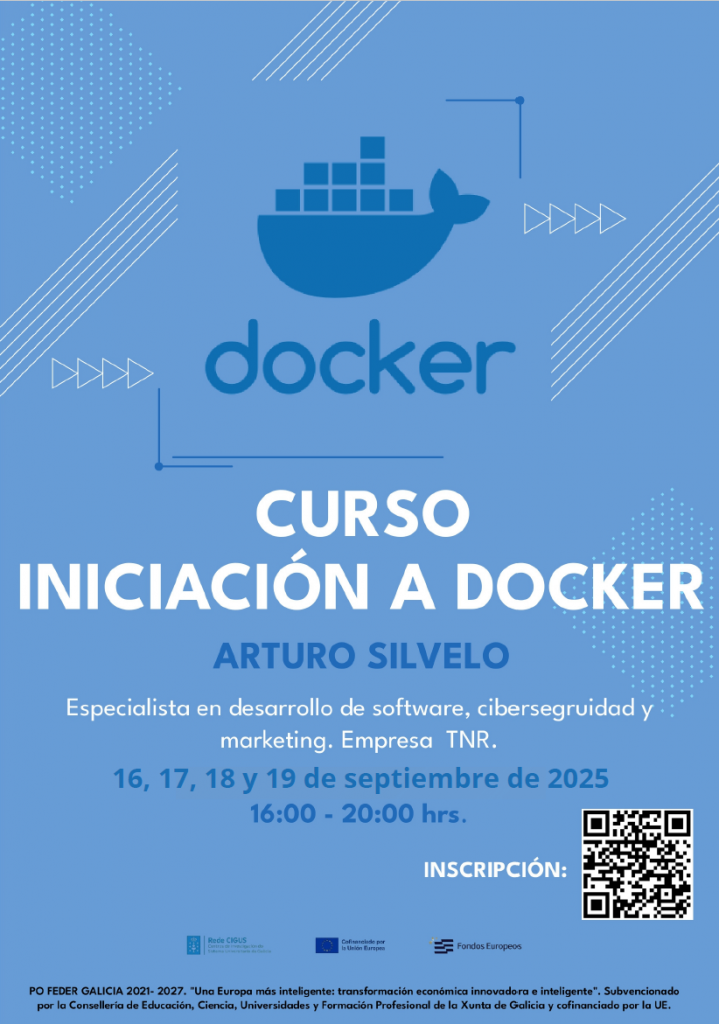
RESEARCH TALK “Artificial Intelligence for Predictive and Prescriptive Analytics: Methods and Applications”
SPEAKER: Paulo Cortez, University of Minho
DATE: Monday, 7 july.
TIME: 12:00 A.M.
LOCATION: Cloud Room, CITIC.
Program:
- 12:00 Welcome
- 12:15: Presentation
- 13:00 Break and networking
- 13:30 – 15:30: 1-1 Meetings
Registration deadline: July 7
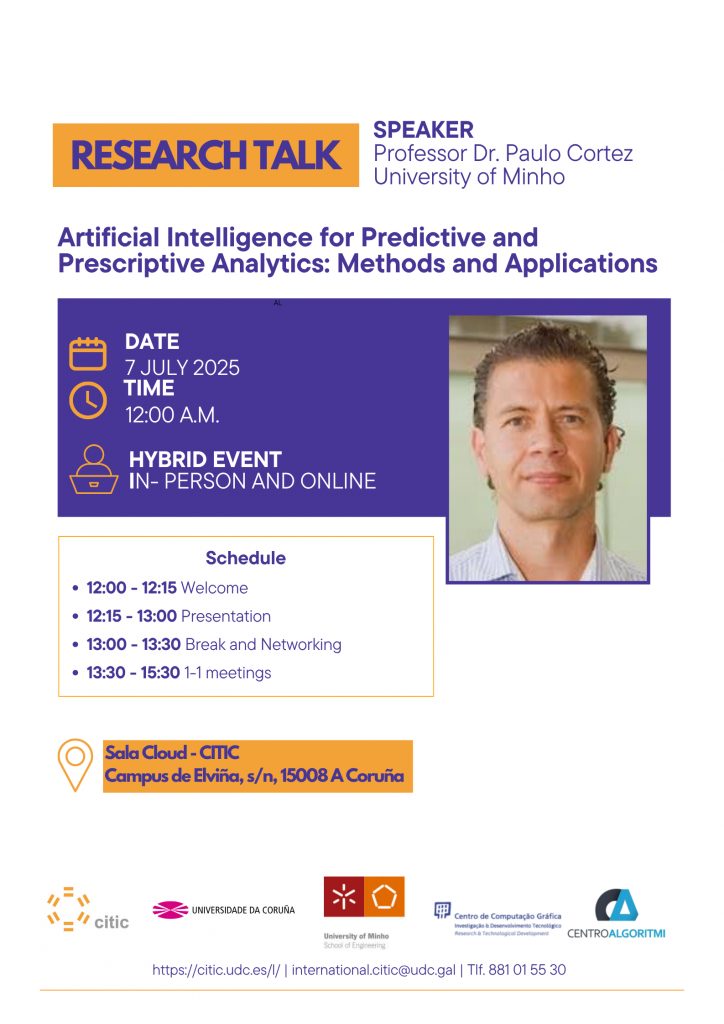
GIT INITIATION COURSE
DATES: 25, 26, 27 and 28 November.
TIME: from 4:00 p.m. to 8:00 p.m.
LOCATION: CITIC facilities.
Program:
Module 1: Introduction to GIT.
- What is Git? Real applications.
- Concept of repository.
- How to install Git and Git Bash.
- Git Bash commands.
- Configure Git user and mail.
- Configure SSH key.
Module 2: Git repositories.
- How to create a Git repository.
- Work address.
- Preparation area.
- Git Directory.
- Git status command.
Module 3: Committees.
- What is a commit?
- How to create a commit.
- Display commit history with git log.
- Set up a Git (Visual Studio Code) editor.
- Change the most recent commit.
- Undo a commit.
Module 4: Branches.
- What is a branch?
- How to create a branch.
- The main branch.
- Change branch.
- Rename a branch.
- Delete a branch.
- Create commits in a branch.
- View the commit history of a branch.
Module 5: Merging.
- What is merging?
- How to merge two branches.
- Merge conflicts.
- How to delete a branch after merging it with main.
Module 6: Introduction to GitLab.
- What is GitLab?
- Create your account and profile.
- Customize the settings of a repository.
- Rename a repository.
- Delete a repository.
Module 7: The Git and GitLab workflow.
- Clone a repository.
- Push changes to GitLab.
- Receive (pull) changes to GitLab.
- HTTPS validation to submit changes.
- Git Pull vs. Git Fetch.
- Fork a repository.
- Clone a forked repository.
- What is a pull request?
- Start and write a pull request.
- Update a forked repository.
- What is an issue?
- How to create an issue.
- Issue templates.
- Tags for issues and pull requests.
- Clone new remote branches to a local repository.
- Delete remote and local branches.
Module 8: GIT Clients.
- Sourcetree.
- GitKraken.
- Visual Studio.
- Intelljj
Registration form: https://forms.office.com/e/vKbpWevVmN
Places are limited and will be awarded on a first-come, first-served basis.
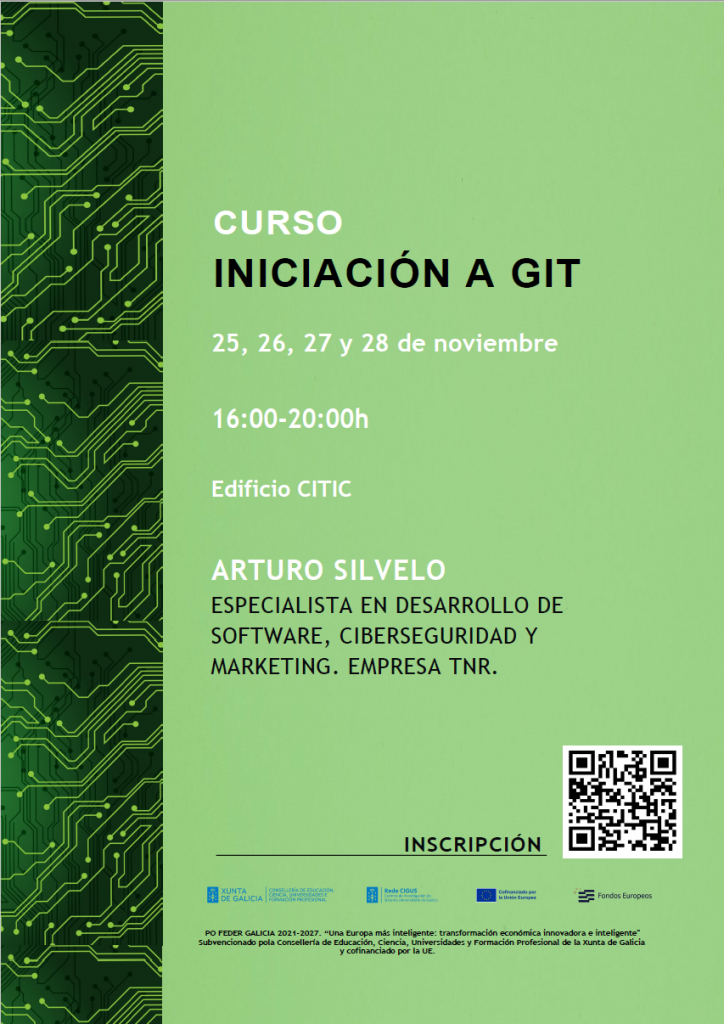
DOCKER INITIATION COURSE
DATES: 5, 8, 12 and 15 November.
TIME: from 4:00 p.m. to 8:00 p.m.
LOCATION: CITIC facilities.
Program:
Module 1: Introduction (2 hours)
- Introduction.
- What is Docker.
- Virtualization.
- Concepts.
- Installation.
Module 2: Containers (2 hours)
- Basic Commands.
- Containers in the background.
- Interactive mode.
- Ports.
- Logs.
- Inspect containers.
- Environment Variables.
- Containers without Services.
Module 3: Networking and Volumes (4 hours)
- What are Volumes.
- Docker volumes.
- Manual Volumes (Data Persistence).
- Networks.
- Connecting Container to Network.
Module 4: Imaging (4 hours)
- What are images
- First image.
- Dockerfile.
Module 5: Docker Compose (4 hours)
- What is Docker Compose.
- Services.
- Networks.
- Volumes.
- Environment Variables.
- Docker Compose.
Registration form: https://forms.office.com/e/fAZS3ZE8zp
Deadline for registration: October 30 at 4:00 p.m.
Places are limited and will be awarded on a first-come, first-served basis
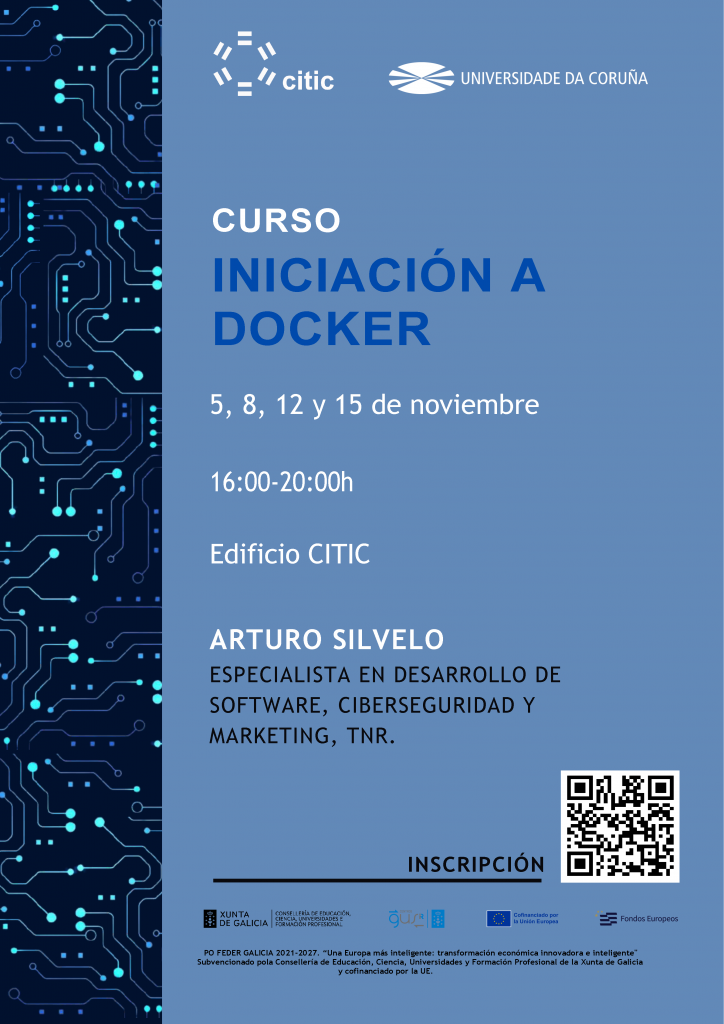
WORKSHOP FOR THE HANDLING OF THE OPTITRACK MOTION CAPTURE SYSTEM
Speaker: Prof. José Ángel López Campos – CINTECX – Universidade de Vigo.
Date: July 23rd, 2024.
Time: 11:00h-14:00 and 15:00-17:30h.
Modality: in-person, Virtual Reality and Motion Laboratory of CITIC.
Objective: To learn about the management and potential use of CITIC’s unique infrastructure of the Optitrack motion capture system (https://optitrack.com/). CITIC in its Virtual Reality and Positioning laboratory has an Optitrack system composed of 8 cameras, data capture equipment and controlled light environment that allow the capture of movement of rigid objects and human bodies. The motion capture system used in the workshop will be Motive with the Body license.
During the workshop an example of the whole workflow of a data acquisition and processing process will be performed:
- Basic features of the motion capture system
- Selection of the capture model
- Capture preparation: suit, marker placement
- Motion capture
- Data preprocessing
- Data export to OpenSIM
- Preprocessing and basic analysis of the biomechanical model
Registrarion form: https://forms.office.com/e/gZuHwwHhMg
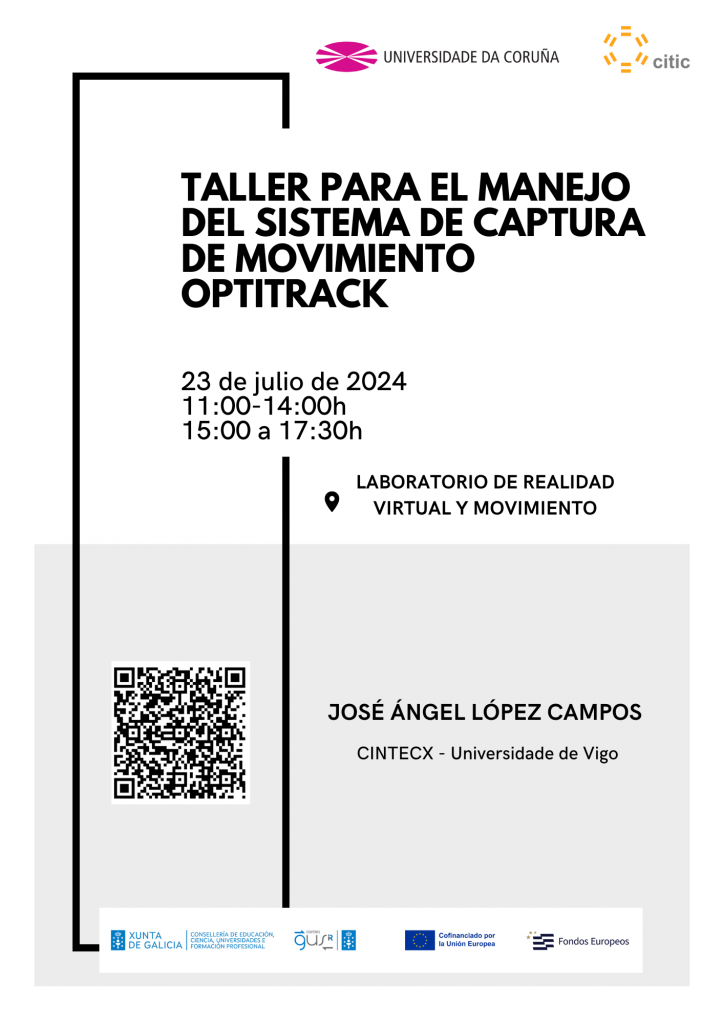
CONFERENCE “TRANSLATIONAL INFORMATICS AND FUTURE DIGITAL MEDICINE”
Speaker: Dr. Bairong Shen. Professor and executive general director of the Institutes of Systems Genetics of the West China Hospital, Sichuan University.
Date: June 6, 2024.
Time: 11:30-13:30 h.
Modality: Cloud Room.
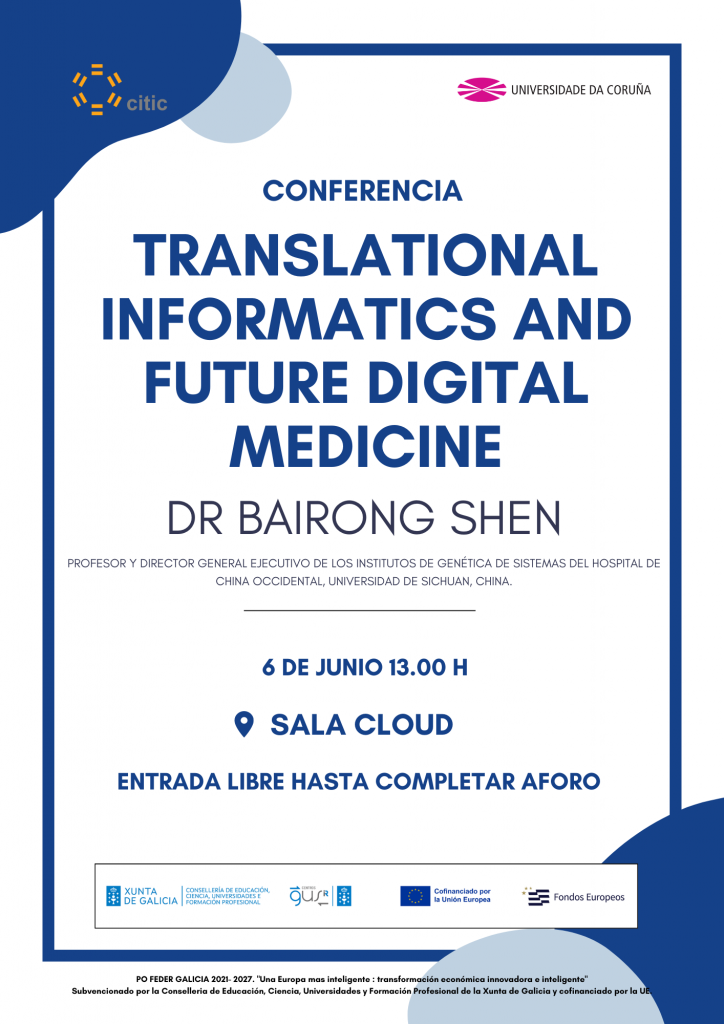
VI XOVETIC CONGRESS
The VI XoveTIC Congress, organized by the ICT Research Center of the University of A Coruña (CITIC), will take place on October 5 and 6, 2023. It is aimed at junior researchers (predoctoral and postdoc) who will present oral communications or posters of their research in the field of Information and Communication Technologies (ICT). The aim is to build a meeting space for scientific debate and thus contribute to its formation.
The conference, which is free to register, will be an ideal opportunity for participants to share their research in a collaborative and relaxed environment.
Contributions to the conference may be original or adapted papers already presented in other forums. All accepted papers will be published in a book of proceedings.
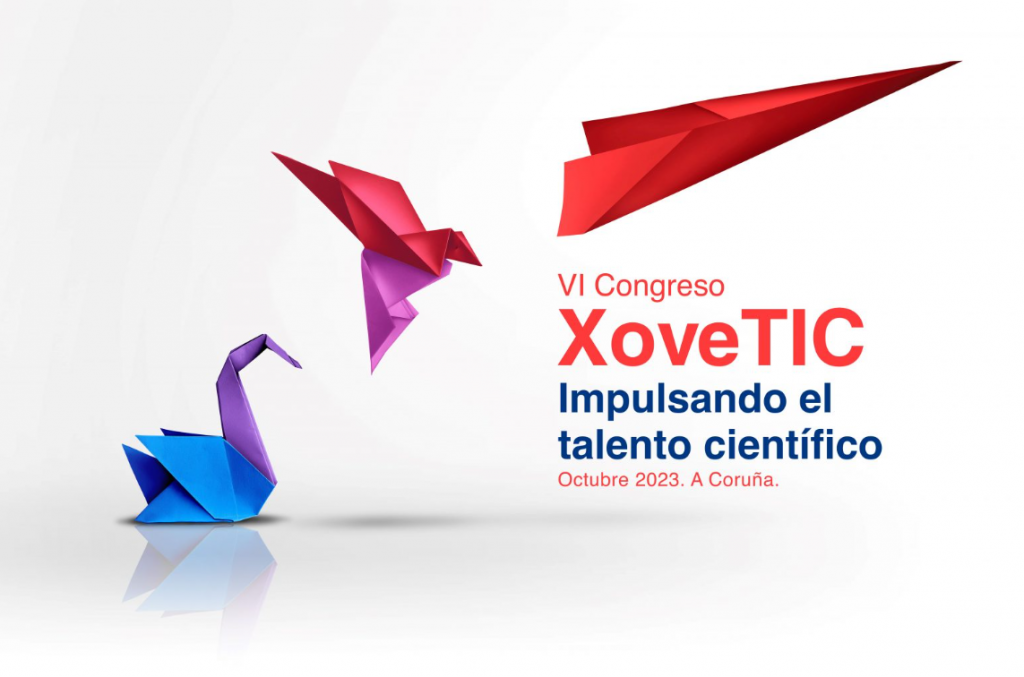
WORKSHOP ON THE USE OF DATA FROM HUMAN MOTION CAPTURE WITH DE OPTITRACK SYSTEM
Speaker: José Ángel López Campos. Professor and researcher in the Numerical Design and Simulation group in Mechanical Engineering at the University of Vigo
Date: September 22th, 2023
Hours: 11:00 a.m.-2:00 p.m.
Modality: in-person (CITIC Virtual Reality and Movement Laboratory).
Objectives: learn the basics of using the OptiTrack motion capture system installed in the CITIC Virtual Reality and Movement laboratory. The objective is to develop a project from its initial motion capture phase and, with a prepared data example, perform post-processing and biomechanical analysis using the free software tool OpenSim.
Registration: https://forms.office.com/e/r1tpVv8AMF

DATA MANAGER FOR RESEARCH MANAGEMENT
- Dates: March 16, 22, 23, 30; April 12 and 13, 2023.
- Time: Wednesday and Thursday, from 10:00 a.m. to 12:00 noon.
- Location: CITIC Connect Room.
- Program:
- Block I. Basic data management.
- Formulas and Functions: Arithmetic operators and types of cell references; Basic functions: Sum, Average, Count, etc.; Formulation with Range names.
- Logical Functions: Conditional functions IF, AND, OR.
- Data search functions in arrays: FindV, FindH functions; Index, Match functions.
- Text and date functions. Advanced Find and Replace: non-printable characters, formats.
- Visual representation of data. Basic graphics, Conditional Formatting. Book views, Freeze columns, Parallel view, Work area.
- Block II. Advanced data management
- Data tools: Data validation, Sorting and filtering, Advanced filters.
- Data import and export. Text and CSV formats. Different separators. Configuration of automatic data import.
- Dynamic Tables and Charts: Creation and modification of dynamic tables. Elaboration of dynamic graphs.
- Recording and execution of tasks.
- Registration
- Limited places. Admission will be by strict order of registration.
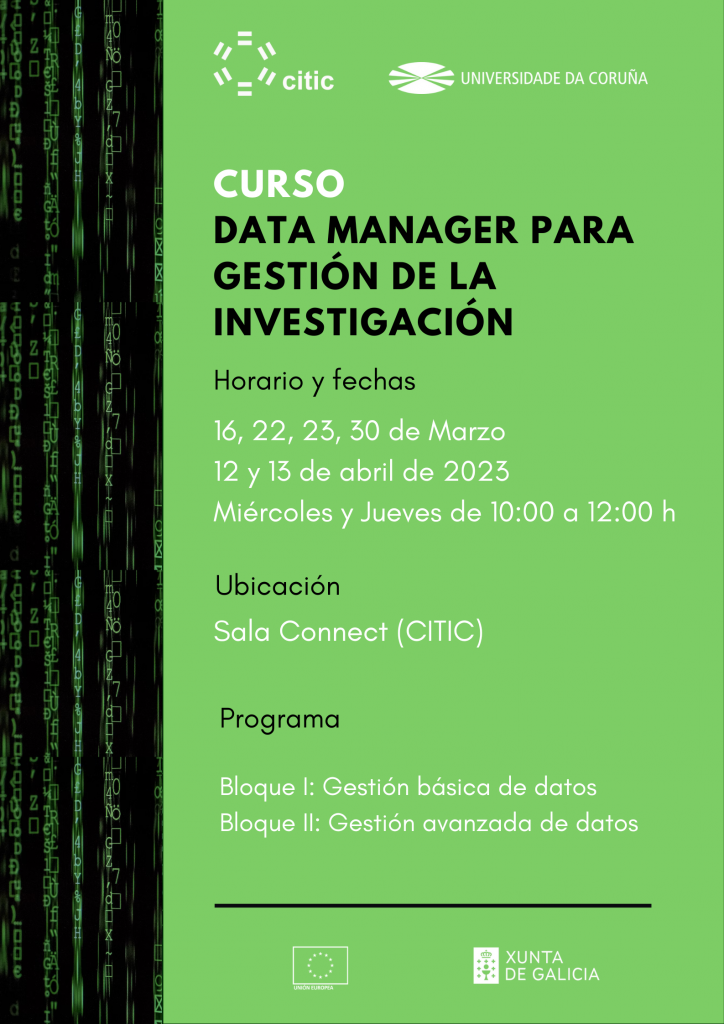
Speaker: Alberto Basalo. Specialist and trainer in Clean Code with Angular.
Dates: 14*, 16, 23 and 30* March; 10, 11, 13, 17, 18 and 20 April.
Timetable: 16:00 to 19:00h. except for 14 and 30 March, which will be from 09:30 to 12:30h.
Modality: Online, except for the sessions on 14 March and 20 April, which will be in person (CITIC Cloud room).
Primarily aimed at:
- Programmers with Experience with HTML and JavaScript.
- Desirable: knowledge of Object Oriented Programming.
- Install, configure and use the Angular CLI to generate, debug and deploy code.
- Understand the modular structure of Angular applications.
- Present and interact with the user through components, directives and pipes.
- Manage multiple paths on the client using Single Page Applications.
- Communicate data with APIs on remote servers.
- Architecture with logic services and reusable presentation components.
- Node LTS
- VS Code Editor or similar
- Hello Angular CLI
- Installing the CLI and building an application
- Basic commands for debugging and running applications
- Organisation and configuration of the workspace
- Application structure
- Modules and components
- Types of modules
- Visibility of components
- Routing and functional modules
- Routing concepts and Single Page Applications
- Routes, modules and components
- Commands and parameters in routes
- Forms and data listings
- Views with rich HTML and linking to models and controller
- Forms for data collection
- Presentation of conditional and repetitive information
- Sending and receiving data over HTTP
- Services and dependency injection
- Consumption of a Rest API
- Common RxJS operators
- Application optimisation
- Asynchronous state management
- Error handling
- Interceptors and security
- Modernised Angular V15
- Look mum without modules
- Functions instead of classes
- Migration strategies
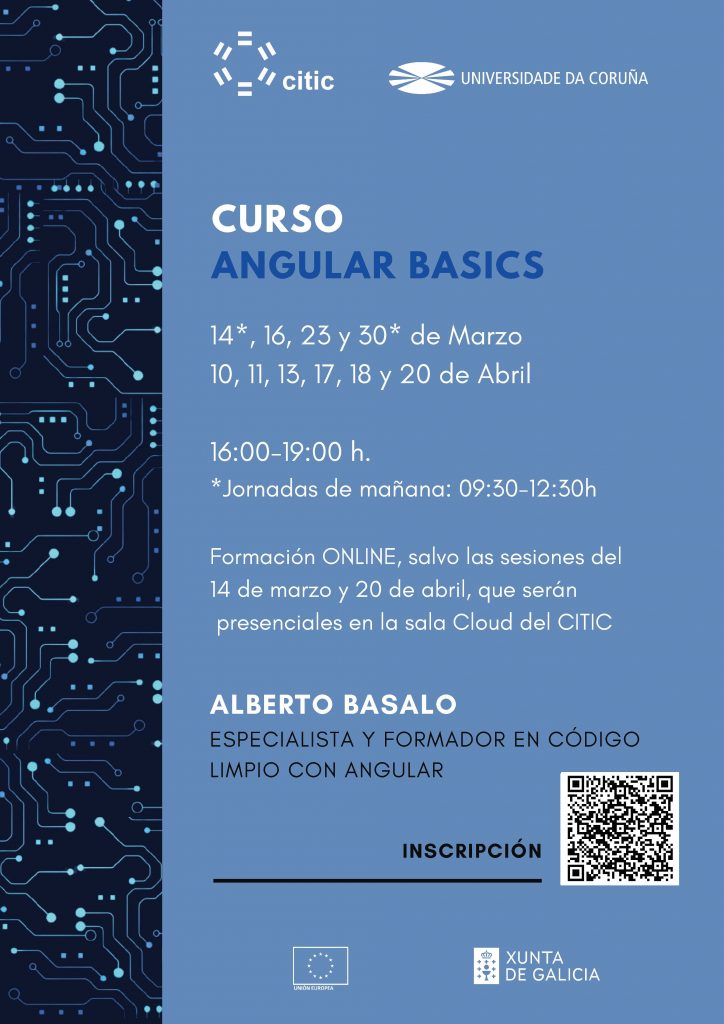
COURSE: SCIENTIFIC AND TECHNOLOGICAL SKILLS
Speaker: Vicente Moret, CITIC researcher and Professor of Computational Science and Artificial Intelligence at UDC.
When: 6-8-10-17*-20-22-27-29 june and 1 july.
(*) 15:00 – 19:00 h with Juan Ignacio Cirac at Fundación Barrié in the event Corunna Innovate Summit (independent register).
Where: Cloud Room (CITIC)
Contents:
- TOPIC 1. INTRODUCTION
- TOPIC 2. MATHEMATICAL FORMALISM
- TOPIC 3. PRINCIPLES OF QUANTUM MECHANICS
- TOPIC 4. REVERSIBLE COMPUTING
- TOPIC 5. QUANTUM INFORMATION
- TOPIC 6. OPERATIONS WITH QUBITS AND QUANTUM CIRCUITS
- TOPIC 7. QUANTUM SIMULATION OF CLASSICAL LOGICAL OPERATORS
- TOPIC 8. QUANTUM ALGORITHMS
- TOPIC 9. FEYNMAN’S UNIVERSAL QUANTUM ARCHITECTURE
- TOPIC 10. FINAL REMARKS
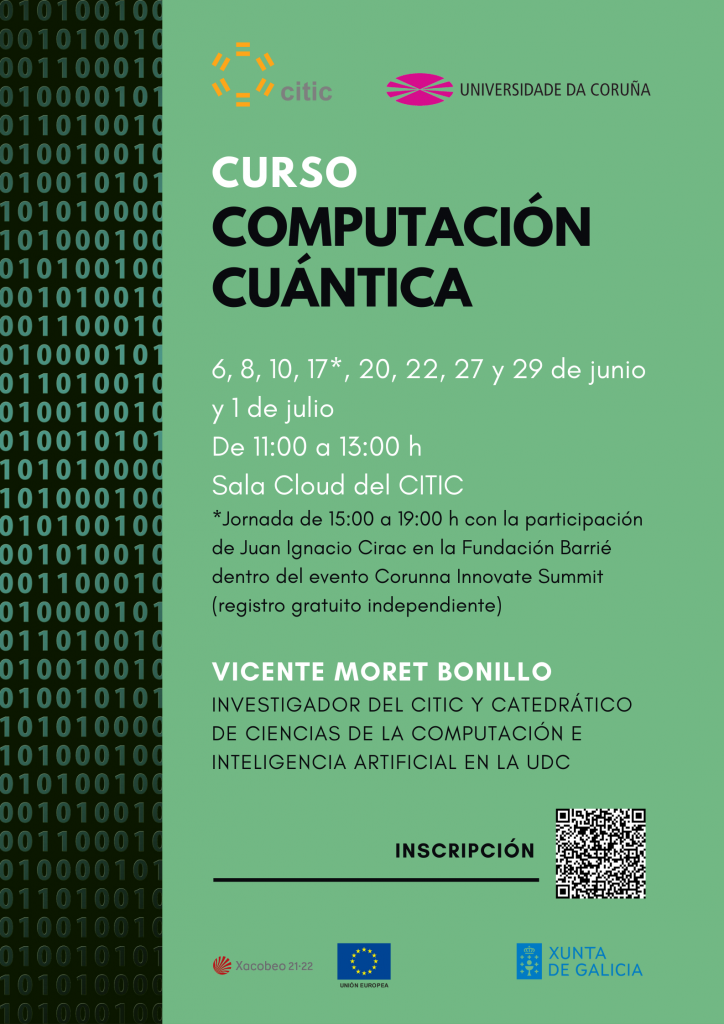
V XOVETIC CONGRESS
The V XoveTIC Congress, organized by CITIC, will take place on October 5 and 6, 2022. It is aimed at junior researchers (predoctoral and postdoctoral) who will present oral communications or posters of their research in the field of Information and Communication Technologies (ICT). The aim is to build a meeting place for scientific debate and thus contribute to their training.
The conference, whose registration is free, will be an ideal opportunity for participants to share their research in a collaborative and relaxed atmosphere.
Papers may be original or adapted from papers already presented in other forums. All accepted papers will be published in a book of proceedings.
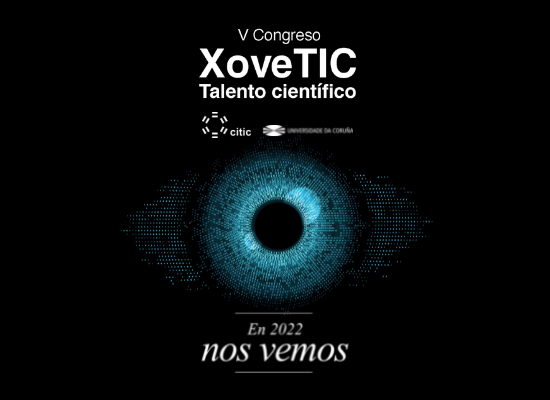
ALL PLACES ARE SOLD OUT! NO MORE REGISTRATIONS ACCEPTED
CURSO FUNDAMENTALS OF DEEP LEARNING
- Fechas: November 7 and 8.
- Ponente: Mario Martínez Zarzuela (Deep Learning and CUDA Ambassador DLI Institute Nvidia).
- Registration
- Limited seating: Admission on a first-come, first-served basis.
- Abstract: Deep learning is a powerful AI approach that uses multi-layered artificial neural networks to deliver state-of-the-art accuracy in tasks such as object detection, speech recognition, and language translation. Through deep learning, computers can learn and recognize patterns in data that are considered too complex or subtle for expertly written software. In this workshop you will learn how deep learning works through hands-on computer vision exercises. You will train deep learning models from scratch, learning tools and tricks to achieve highly accurate results. You will also learn how to take advantage of freely available state-of-the-art pre-trained models to save time and make your learning models more accurate.
- Program:
- Day 7
- 9:30 a 11:30. The Mechanics of Deep Learning
- 11:30 a 12:00. Coffee break
- 12:00 a 14:00. Pre-trained Models and Recurrent Networks
- Day 8
- 9:30 a 11:30. Review and extension
- 11:30 a 12:00. Coffee break
- 12:00 a 13:30. Assessment
- Day 7
- Access to the course through this link
